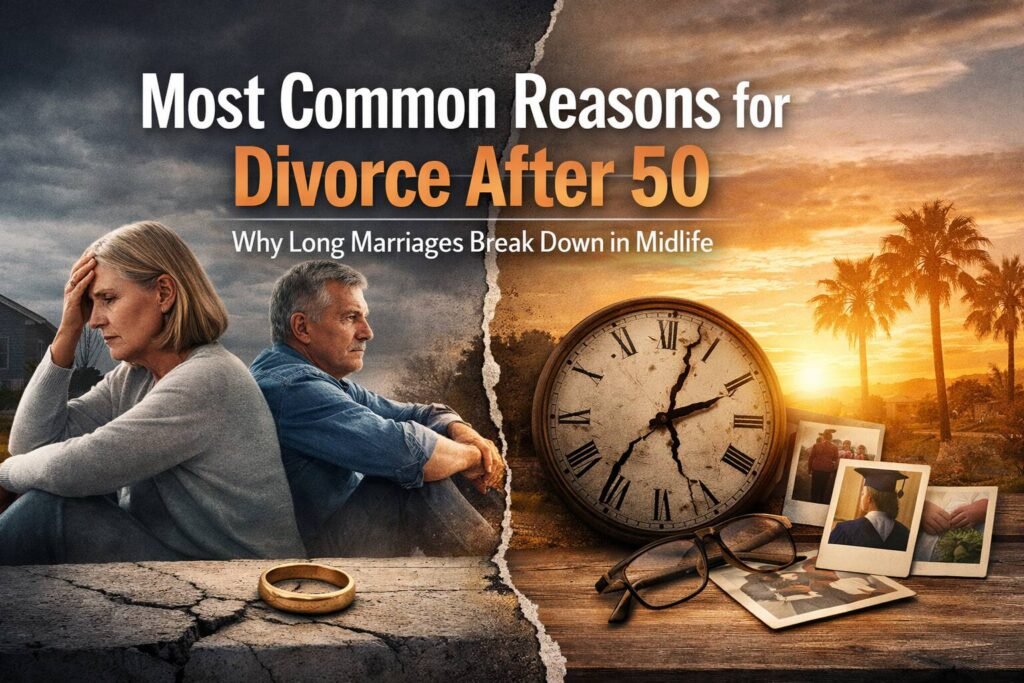If you’re reading this, you may already be thinking about divorce, in the middle of it, or trying to understand how a long marriage reached this point. Divorce after 50, often called gray divorce, is becoming more common, and it rarely happens on impulse.
For many people, this moment comes after decades of holding things together, staying for the children, managing responsibilities, and putting personal needs aside. Nothing may have “gone wrong” suddenly, but over time, emotional connection, intimacy, or companionship quietly faded.
Divorce later in life is different from divorce at a younger age. Shared history is deeper, children are often grown but still emotionally affected, and the weight of what has already been invested makes every decision feel heavier. This page isn’t here to judge or push you in any direction, only to help you understand why so many long marriages reach this crossroads after 50.
Why Divorce After 50 Is Different From Earlier Divorce
Divorce after 50 is rarely about a single breaking point. It usually comes after years of emotional fatigue, quiet compromise, and feeling like you’ve already tried everything you knew how to try. Unlike earlier divorces, there’s often no dramatic event, just a growing sense that the relationship no longer feels emotionally alive or safe.
By this stage of life, many couples have spent decades prioritising children, work, finances, or family responsibilities. Once children grow up or life slows down, the emotional distance that was easier to ignore becomes harder to live with. What once felt manageable can start to feel unbearable.
There’s also more at stake. Shared history, routines, health changes, and fears about starting over make every decision heavier. That’s why divorce after 50 often feels less like giving up and more like confronting a reality that’s been quietly building for a long time.
The Most Common Reasons for Divorce After 50
Divorce after 50 usually isn’t caused by one big problem. It’s the result of many small, unresolved issues that piled up over years. These are the reasons people most often describe when they finally reach this point.
Emotional distance that never got repaired
Many couples say they stopped feeling emotionally close long before divorce came up. Conversations became practical, not personal. Feelings stopped being shared because it felt pointless or unsafe.
Living like roommates, not partners
A very common theme is “we coexist, but we’re not really together.” Daily life runs smoothly, but there’s no warmth, curiosity, or emotional presence anymore.
Years of unspoken resentment
People often admit they swallowed their frustration for years to keep the peace. Over time, resentment replaced affection, and even small things started to feel intolerable.
Loss of intimacy and physical closeness
This isn’t only about sex. Many describe a lack of touch, affection, or feeling desired. For some, intimacy disappeared quietly and was never addressed.
Staying together only for the children
A large number of couples say they stayed “for the kids.” Once children grew up or moved out, the relationship felt empty without that shared purpose.
Feeling emotionally lonely inside the marriage
One of the most repeated statements is, “I felt more alone with my partner than without them.” Emotional neglect, not conflict, often pushes people toward divorce.
Growing into different people
Over decades, values, priorities, and identities change. Many realise they no longer recognise each other, or want very different things from life now.
Mental and emotional exhaustion
Especially common among caregivers and partners who carried most of the emotional load. At some point, people say they simply didn’t have the energy to keep trying.
Health changes and caregiving imbalance
Chronic illness, menopause, erectile issues, or becoming a caregiver often shift the relationship. When support feels one-sided, emotional connection suffers.
Retirement exposing relationship cracks
Spending more time together after retirement brings unresolved issues to the surface. Distractions disappear, and emotional gaps become harder to ignore.

Feeling taken for granted
Many people say they felt invisible or unappreciated for years. Effort faded, appreciation stopped, and the relationship felt transactional.
Financial independence changing tolerance
Especially for women, financial stability later in life reduces the need to “endure” unhappiness. People feel freer to choose emotional well-being.
Communication shutting down completely
Not fighting anymore doesn’t mean things are better. Many couples stop talking about anything meaningful because it feels hopeless or exhausting.
One partner doing all the emotional work
A repeated complaint is carrying the emotional weight of the marriage alone. Over time, this imbalance leads to burnout and withdrawal.
Fear of spending the rest of life unhappy
A common turning point is the realisation: “If nothing changes, this is how the rest of my life will feel.” That thought alone pushes many toward divorce.
How Divorce After 50 Affects Men and Women Differently
How Divorce After 50 Often Affects Women
Many women describe reaching divorce after years of emotional exhaustion rather than sudden anger. They often carried the emotional labour of the relationship, tried to communicate problems, and stayed for the children or stability. By the time divorce is considered, the emotional connection may already feel gone.
After separation, women commonly feel a mix of relief, grief, and guilt. Relief from no longer holding everything together, grief for the life they hoped for, and guilt about disrupting family stability, even when children are grown.
How Divorce After 50 Often Affects Men
Many men experience divorce later in the emotional timeline. They may not fully realise how disconnected the relationship had become until separation is already happening. What felt manageable or “not that bad” to them may have felt deeply lonely to their partner.
After divorce, men often struggle with sudden emotional isolation. Loss of daily companionship, routines, and emotional support can feel overwhelming, especially if their social world was closely tied to the marriage.
Is Divorce After 50 a Failure or a Transition?
Many people reach this stage carrying a heavy sense of shame. There’s often a quiet belief that a long marriage ending must mean personal failure, poor choices, or not trying hard enough. These thoughts can be especially strong after decades of commitment and sacrifice.
Social pressure makes this harder. Friends, family, and cultural expectations often frame staying married as success, even when the relationship has become emotionally empty or painful. For people over 50, divorce can feel like admitting defeat rather than responding to reality.
But for many, divorce at this stage isn’t about giving up. It’s about recognising that holding everything together came at a personal cost. Seeing divorce as a transition rather than a failure allows space for honesty, emotional repair, and a different kind of stability moving forward, whether alone or eventually with someone new.
Conclusion
Divorce after 50 is rarely a simple decision. It usually comes after years of reflection, emotional effort, and trying to make things work in ways that others may never see. If you’re at this stage, feeling unsure, conflicted, or emotionally tired doesn’t mean you failed, it means you reached a point where honesty became unavoidable.
Some people move forward with divorce feeling clearer. Others realise they need space to understand what has changed and whether anything can still be repaired. There is no single right outcome, only the need to understand your situation without fear, pressure, or shame.
If you’re not looking for quick answers but want clarity, support, or a safe place to talk things through, professional guidance can help you make sense of what you’re feeling, whether you stay, separate, or are already in transition.
Need support before making a final decision?
If you’re struggling with emotional distance, unresolved conflict, or uncertainty about your marriage, online marriage counselling can help you explore your situation calmly and honestly, from the comfort of your home.
FAQs About Divorce After 50
Is divorce after 50 becoming more common?
Yes, divorce later in life is becoming more common. Many long marriages end not because of one major event, but because emotional needs, identity, and expectations change over time, especially once children are grown and daily responsibilities shift.
Why do couples divorce after decades together?
Most couples don’t divorce suddenly after 20 or 30 years. It usually happens after long periods of emotional distance, unresolved resentment, loss of intimacy, or feeling disconnected while continuing to function as a family or partnership.
Is it selfish to want a divorce after 50?
Wanting a divorce at this stage doesn’t automatically mean selfishness. Many people reach this point after years of trying, compromising, and putting others first. Wanting emotional peace or honesty later in life is a human need, not a moral failure.
How does divorce after 50 affect children who are already adults?
Even adult children can be emotionally affected by their parents’ divorce. They may struggle with changes in family structure, traditions, or identity. However, many adjust over time, especially when parents communicate openly and avoid putting children in the middle.
Is it too late to repair a marriage after 50?
It’s not always too late, but repair requires willingness from both partners. Some couples are able to reconnect with honest communication and support, while others realise the relationship has already emotionally ended. Understanding which situation you’re in often brings clarity.




